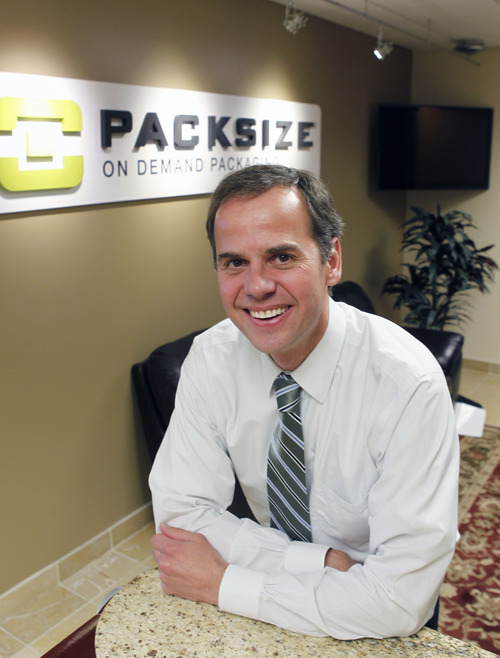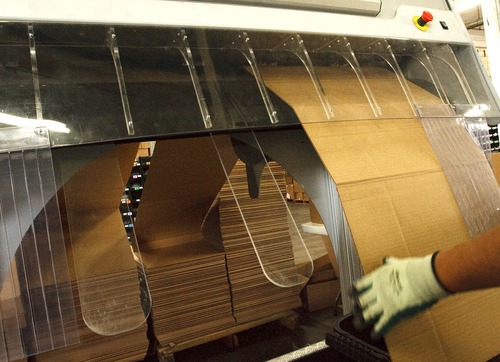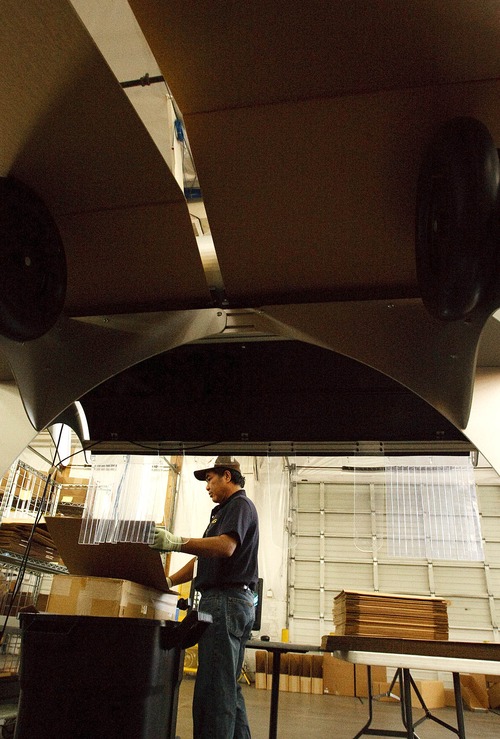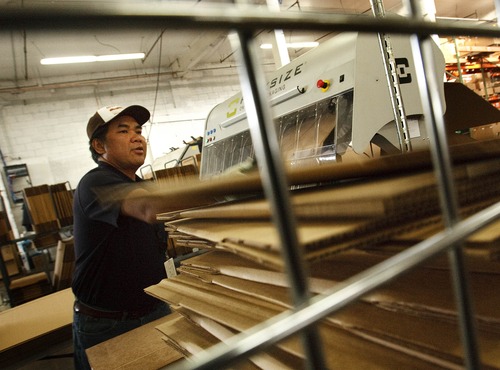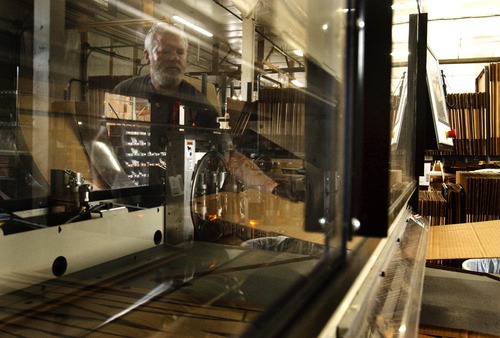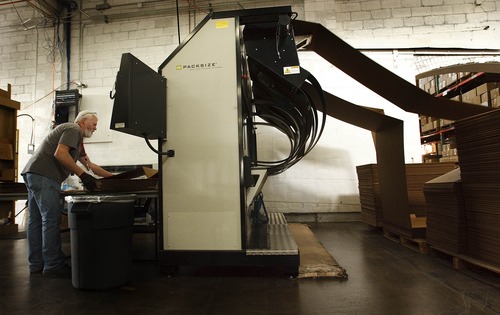This is an archived article that was published on sltrib.com in 2012, and information in the article may be outdated. It is provided only for personal research purposes and may not be reprinted.
How do you take the lowly shipping box and turn it into a $100 million company?
Hanko Kiessner knows how. Ten years ago, he established Packsize International, a Salt Lake City company that today is poised to be elevated from obscurity to fame. With the signing of office products giant Staples Inc. to a technology license, Packsize may be about to disrupt the cardboard box business much the way laserjet printers changed desktop publishing or digital cameras upended the photography industry.
The company gives away — yes, gives away— to customers the machines it manufactures in Sweden that cut the corrugated cardboard to virtually any dimension, almost in the blink of an eye. Although Kiessner prefers to refer to the freebie concept as a "no-cost lease," by any name the machines he provides empower users to make custom, form-fitting boxes for anything they ship, reducing packaging volume by 30 percent to 40 percent. Instead of containers that are too big and that have to be stuffed with filler materials to keep the contents in place, companies get exactly the right box with virtually no waste. Customers pay only for the cardboard.
"You can fit the box to the size of the products, and just given [the technology's] flexibility and the variety of sizes that it can make, I don't think there is anything on the market that can touch it right now," said Don Ralph, senior vice president of supply chain and logistics for Staples.
With $25 billion in sales last year, Staples is the world's largest office products company and a juggernaut in the world of online retailing. Second only to Amazon.com in Web sales, 40 percent of its 2011 sales were deliveries. The company ships as many as 1 million boxes a day.
On Nov. 27, Staples announced it had adopted Packsize's technology and going forward would ship only boxes it had customized to each order instead of relying on thousands of identical boxes it had purchased from makers such as Georgia-Pacific and Boise Cascade that almost always were too big. The Packsize technology allows Staples to reduce the average size of its cardboard boxes by 20 percent and cut the use of plastic air pillows by 60 percent. Staples also expects to reduce its annual carbon footprint by 30,200 tons, saving the equivalent of 120,000 trees a year.
"I think it's significant," Ralph said. "People didn't like receiving a big box with small products in it. Now, we can give them the exact size box they need for those products."
An idea is born • Kiessner, 46, a German citizen with undergraduate and graduate business degrees from the University of Utah, is a man on a mission. He claims to have always been interested in sustainability, a concept the London-based Financial Times defines as a process by which companies manage their financial, social and environmental risks. These three impacts are sometimes referred to as profits, people and planet. Packsize's offices in Salt Lake City are lighted with electricity generated from solar and wind. With close to 40 Chevrolet Volts, Nissan Leafs and Toyota Priuses, the company may have the largest plug-in fleet in Utah.
Packsize's box-making machines are manufactured at its factory in Sweden, where the company is neighbors with Internet phone company Skype and Mozilla, the Internet browser. ABB Robotics is also nearby; in fact, Packsize's factory is in a former ABB Robotics building. Kiessner said the building is 100 percent carbon neutral. Most power is hydroelectric; the rest comes from nuclear energy.
Upon earning a master's of international business degree from the U., Kiessner returned to Germany to take a job in his family's corrugated cardboard and printing business. He tried to establish a business line selling custom box-cutting machines to customers, but got few takers. Then one day, while driving on the autobahn, a light went on. "OK," he recalls thinking, "now I have it. You cannot sell the machines. You have to give them away."
If it weren't for his wife, Kiessner might have stayed in Germany. His career at the family business was progressing, in spite of his lack of success selling box-making machines. She offered an ultimatum. Either they could stay in Germany, where she was unhappy, or they could move back to Salt Lake City, where she grew up, and he could restart his career.
"That's when we created this new business model," Kiessner said. "And it took off."
Building a base • Back in the U.S., Kiessner started Packsize in the basement of his in-laws' home. The company had almost no capital. Kiessener asked a bank for a line of credit, but was turned down. So he turned to his father, who contributed his pension savings. That was enough to build the first of five machines and jump-start the business.
"We said, look, it doesn't matter where these machines go, as long as we do the right packaging business model, where Packsize provides the equipment and we make it an easy decision for the customer. We don't ask them for the capital up front. And then we become their partner," who analyzes the customer's needs, maintains the equipment and upgrades it when necessary, Kiessner said. All the client needs to do is pay a subscription fee.
The past 10 years have been devoted to building a customer base and refining Packsize's machinery. Today, the equipment ranges in scope from a mechanism that can box a couch to a table-top device that cuts a corrugated container in less than a second.
By 2004, the company had established a presence in the furniture industry. Three years later, it picked up a $4.6 million investment from Peterson Partners, a Salt Lake City venture capital firm that also has bet on JetBlue Airways and Energy Solutions, the nuclear waste disposal firm. Today, Packsize's clients include printing companies, manufacturers, furniture and cabinetmakers, and order-fulfillment businesses in the U.S. and Europe.
Smith Optics, an Idaho-based maker of sunglasses and ski goggles, has used a Packsize machine at its Clearfield warehouse for about four years to make as many as 40 different custom-sized boxes.
"It's saved us money, time and space. It's allowed us to ship orders to specific customers in the configurations that they require, and without Packsize we would not have been able to do that," said Smith supervisor Scott Patten.
Patten said the warehouse recently got a phone call from a large Canadian distributor that wanted its order shipped in boxes measuring 10 inches by 10 inches by 12 inches. Smith Optics didn't have boxes with those dimensions on hand. "But with Packsize, we were able to just punch it into the machine and get that carton configuration. We shipped it that day. If we were ordering that from a typical box carton manufacturer,it would have taken several weeks, probably."
Patten wouldn't get specific about Smith's cost savings. But he said the company would probably have to fill 20 percent of its warehouse with pre-made boxes if it didn't have the ability to make custom-sized boxes on demand. The Packsize machine also saves money on shipping because the boxes are smaller, "and I'm not filling boxes with bags or paper or Styrofoam," he said.
Taking risks • Kiessner says Packsize's revenue has been growing by about 35 percent since the company's founding. With Staples as a customer, he expects that rate to accelerate, possibly to about 40 percent a year. Staples delivers hundreds of millions of boxes annually, all of which will be cut by Packsize machines to any size from corrugated cardboard that the company also supplies free of charge.
"We are prepared potentially not to grow at that percentage rate," he said. "But there is also something that happens when a new, disruptive technology [emerges], and we consider our technology to be new and disruptive. And once you get to this inflection point, you have to grow and claim the customer base, claim the opportunity out in the market, or someone else will."
Inflection points are events that result in a significant change in the progress of a company. Generally, they are positive, but they can be negative, too.
It's clear that Kiessner thinks the Staples deal is an inflection point. Only Amazon is a bigger online retailer. He won't say whether Packsize is in talks with Amazon or anyone else. But he notes that his machinery has been refined to the point where the company can support operations that ship 250,000 boxes in a day.
"We [provide] a product that everyone perceives to be a nuisance, quite frankly. None of our customers has it as their core competency to make boxes," he said.
"That's why we had to package this as a business model where we can deliver savings on day one, and Packsize had to take all the risk in providing the equipment, basically to drop off a piece of equipment and then give them the corrugated [cardboard] for free," Kiessner said.
Twitter: @sltribpaul —
A peek inside Packsize International
Founded • Salt Lake City, 2002
CEO • Hanko Kiessner
Employees • 102, as of Dec. 31
Revenue • Approaching $100 million
Customers include • Staples, Overstock.com, Ikea, Ethan Allen, Rubbermaid, GE


